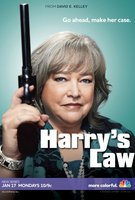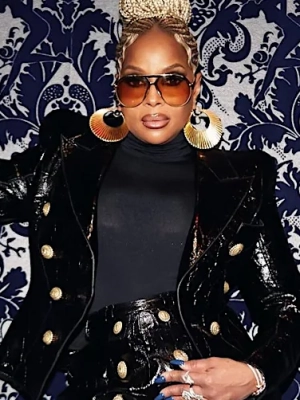Harry's Law Episode 2.09 Head Games
- Kathy Bates as Harriet "Harry" Korn
- Brittany Snow as Jenna Backstrom
- Aml Ameen
- Nate Corddry
- Christopher McDonald
- Karen Olivo
- Mark Valley as Oliver Richard
Tommy approaches Assistant District Attorney Kim Mendelsohn, trying to cop a plea for his client, a single mother who lost her house and then robbed a bank in an attempt to support her family. Tommy wants five years, but Kim's only offer is for 20. Tommy won't accept that and returns to the office to canvas his colleagues for a creative defense. Cassie offers a longshot: outrageous government conduct. Used mainly in drug cases, it holds that the government's conduct is so outrageous that it violates the principles of fairness.
Harry meets with John and Susan Duggan, parents who want to bring a case against their local high school for its football program; their son died of a traumatic brain injury after playing. Harry regretfully informs them that the school will not acknowledge any wrongdoing nor even apologize. In Harry's professional opinion, the case would be thrown out of court in a summary judgment. Nonetheless, the parents want to press ahead with a civil action. They want to spread the word about how dangerous high school football really is.
In the courtroom, the D.A. shows security tape of Tommy's defendant, Elaine Lister, robbing a teller. The teller testifies that she didn't take Elaine's note seriously at first, but realized after she pulled a gun that she was determined. She recognized Elaine because she was a regular customer of the bank, one who had been in the bank a lot as she tried unsuccessfully to save her home from foreclosure. On cross-examination, Tommy gets the teller to admit that she muttered "good for you" to Elaine as she handed her the money.
Susan and John Duggan are being deposed. With attorneys for both sides present, they review the tape of their quarterback son taking a nasty hit and being slow to get up. The boy staggers to the sidelines; five minutes later he died. Susan acknowledges that the coach and the team did not direct the boy to go back in after he was injured. But she holds that the football program itself is inherently dangerous, and therefore, the school was complicit in her son's deadly injury. The school's attorney gets Susan to admit that she signed a waiver for their son and that they acknowledged that football is inherently dangerous. Nonetheless, she holds the school responsible for her son's death.
The bank's loan officer, Robert Gray, testifies for the prosecution about Ms. Lister's foreclosure. She couldn't pay her mortgage despite several extensions, and eventually they had no choice but to foreclose, he explains. He recalls that Elaine vowed that foreclosure would not be the end of the matter. Tommy cross-examines and posits that the bank gave his client a teaser rate loan knowing she wouldn't be able to make the payments when the rate adjusted. Gray denies this. Tommy tells the court that the bank's parent company received billions of dollars in bailout money from the government - money that the bank had an obligation to use to try to help customers like Elaine Lister.
Back at the office, Tommy explains to Cassie that he wants her to lead the questioning of Elaine; he'll also want her to talk to Mendelsohn again about a reduced sentence. Ollie snidely pipes in that their client is guilty, and it's all caught on tape. Tommy dismisses Ollie who then bumps into Chunhua and invites her out for coffee. Tom
my tells Adam this; Adam's incensed. Harry gets the judge to agree to hear testimony from the treating physician before he'll pass judgment. Harry and Adam also line up an expert witness. The treating physician explains that the hit that boy took probably wasn't what killed him. It was the cumulative effect of many hits. He explains that medical research is discovering that traumatic brain injury risk increases greatly after both concussive hits and more minor sub-concussive hits, i.e. the sorts of tackles that quarterbacks routinely endure and shake off.
Elaine Lister takes the stand. She explains that she lost her job, that her ex-husband couldn't meet his alimony payments and that she had realized her house was in jeopardy. She approached the bank with hope for a modification of her loan, but they were of no help. She grew angry, she testifies. Rather than let her children go homeless or starve, she decided to take matters into her own hands. She got her gun, went to the bank and told the teller she needed money to feed her children. She goes on to give her perspective that the government was complicit in all of it: fattening coffers of the corporate banks while people lost their homes.
Harry brings an expert witness to the stand. A research neurologist explains that football is exceptionally dangerous, especially among young players. His studies indicate cognitive declines in almost all youths who have played. He says that he studied the autopsy results of the Duggan child and found that multiple sub-concussive blows had left markers indicating almost certainly that there was cognitive impairment. The school's lawyer cross-examines the doctor and gets him to admit that he'd like to see lots of sports banned that involve regular head trauma: hockey, wrestling, competitive cheerleading, soccer, etc.
Cassie meets with Mendelsohn in her office to try to secure an attractive plea, but Kim's not open to a new deal.
The lawyer from the high school begins his closing argument to the judge. He expounds on how sports are inimical to our culture and that they grow more dangerous all the time. In particular, football is central to our culture. The boy died doing what he loved, but blaming the high school is not the answer, he tells the judge. Harry's up next. She agrees that football is an important part of America. But she argues that it comes with a deadly cost. Traumatic brain injuries are much more common than we wish to admit. She points to an article from Malcolm Gladwell that compares football to dog-fighting: blood sports that pit competitors in a ring for our entertainment. Other sports are dangerous too, but football is inherently dangerous; the play of the game results in blows to the head on almost every play. The human head is not meant to endure football, she tells the judge.
Back in the office, Chunhua pulls Adam aside. She tells him she's not comfortable being told whom she can or can't see for coffee. Adam admits he can't control her personal life outside the office. "I'm just trying to protect you from dangerous snakes like Ollie," he tells her. Chunhua informs Adam that she'll decide whom she spends time with outside the office. Adam lets it go.
Mendelsohn starts her close. She acknowledges that Susan Lister is a good person living in a difficult time. Good people are increasingly taking actions that are dangerous to society. When the defendant walked into a bank and shoved a gun in a teller's face and then walked out with $60,000, no one in the press or the public seemed outraged at all. People are fed up and increasingly being pushed to the brink. The D.A. goes on: without consequences for these increasingly criminal behaviors, our society grows perilously close to anarchy. Our only defense is to advise the lawbreakers to stop their course of action. She tells the jury that is exactly what she needs them to do.
Tommy begins his close by reminding the jury that his client did in fact steal $60,000. But, he tells them, the heads of major banks took vastly larger sums of money - and none of them have been convicted of anything. It's a gross injustice. He says that Elaine Lister intentionally went into the bank without a mask, knowing she'd be caught, in order to make a statement about the bank. She's a hero, he tells the jury. He explains the principle of outrageous government conduct. "If not now, when?" he asks the jury. He concludes by pointing at a hero (Lister) and contrasting her with the government (Mendelsohn).
The judge announces his ruling in the football case. He notes that the sport has been controversial for a long time; Theodore Roosevelt called for an investigation of it in 1905. He acknowledges the danger of concussions, but goes on to say how preposterous the notion of banning the sport would be. It is a cherished tradition, but then he says it is one that should be re-examined. The judge denies the school's request for a summary judgment. The case will move forward in the courts. It's a victory for Harry and the Duggans.
The jury returns with a quick verdict in the Lister case. The foreman reads their decision: guilty. Susan thanks Tommy and Cassie for their efforts. He assures her that they'll do their best to minimize the sentence. Later, in the bar, Harry and Tommy compare their cases. Tommy's amazed that Harry got the judge to question the propriety of football. An amazed Harry agrees with Tommy: there's nothing more American than football, guns and apple pie.









